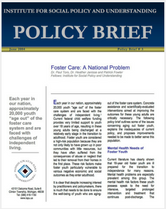
Foster Care: A National Problem
Each year in our nation, approximately 20,000 youth “age out” of the foster care system and are faced with the challenges of independent living. Current federal child welfare funding provides very limited support to youth over 18 years of age, resulting in these young adults being discharged at a relatively early stage in the transition to adulthood. Foster youth are considered a high-risk population because they are not only likely to have grown up in poor communities with little resources, but they have often suffered from the consequences of abuse or neglect that led to their removal from their homes in the first place. These risk factors make foster youth particularly vulnerable to various negative economic and social outcomes as they enter adulthood.
It is clear that despite increasing interest by practitioners and policymakers, there is much that needs to be done to ensure the well-being of youth who are aging-out of the foster care system. Concrete assistance and scientifically-evaluated interventions aimed at improving the outcomes for these young adults are critically necessary. The following policy brief outlines some of the issues concerning aging out foster youth, explains the inadequacies of current policy, and proposes improvements needed to be made to better serve this population.


